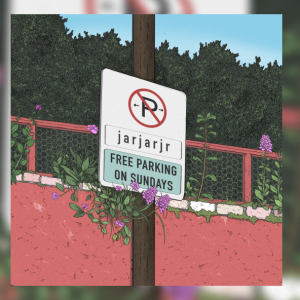What does it mean to be hungover? Your insides wretch, and as a distraction, you might adopt a contemplative existence for the day. You only ever stumble, though, upon a dead end of guilt and hostile haze, of erratic spoken soundbites from the night before that you decide not to confront.
That’s the state in which the navel gazing protagonist of jarjarjr’s EP ‘Free Parking on Sundays’ finds himself, “following a heavy Saturday night”. That soul-searching feels like a cornerstone of the Cork producer’s lo-fi hip-hop, providing a spiritual link to his introverted fanbase over the Internet’s back channels.
They come in droves, too – single tracks clock up views by the millions on jarjar (real name Robert O’Halloran)’s YouTube and SoundCloud pages. Though the melodic boom-bap connoisseur has seen success producing for Kojaque and getting shout-outs on Indie Shuffle, it pales in comparison to his numbers accrued in the truly DIY echelons of lo-fi. For a genre characterised by a lack of big stars and an unfortunate association with homework, O’Halloran comes as close as anyone to stardom within it, all thanks to the recognisable sound he’s crafted.
His beats play like a personal, meditative absorption of the environs, where meticulously chosen and chopped samples form diverse yet cohesive wholes. Even when a jarjarjr beat is looped, something new can be found in each revolution.
‘Free Parking’ advances that vision, with more organic instrumentation than ever. Any would-be gaps that might be expected from shedding Nas and MF Doom vocal samples and starting from scratch are filled in with quirky authorial command. U Turn is a highlight in that regard: an amorphous concoction of glossy guitar licks, piano stabs and submerged vocal chops, the track’s various ephemeral elements loop seamlessly into a lingering, nostalgic hypnosis. On Wake Up Call, chords form their own chatty monologues, stopping to take breathers here and there before darting off in unexpected directions.
In its essence, ‘Free Parking’ is a free personality’s grapple with the fundamental necessity of being. We hear our hungover protagonist force himself out of the house and into everyday mundanity (he goes and orders an iced latte). Likewise, much of jarjar’s natural jazzy quirk feels distorted by the practical here, as though to dutifully accommodate the classic frameworks of hip-hop. The captivatingly anxious, chord-heavy intro of Close Encounter could go in any direction, then goes in a fairly conservative one – mellow keys that take most of the edge out of the foundation set by the intro. The gastric bass rumble of Call It Madness – almost uncomfortably onomatopoeic of the hangover – experiences similar stagnation, straying further from playfulness and then resorting to a high-end synth to inject life into the back end of the track.
Ironically, those sparser moments on ‘Free Parking’ would best accommodate a rapped feature, yet seem to go most against the grain of this complex EP’s singularity. Its consistent drums and exceedingly smooth song-to-song transition might deceive you, but the project’s unique incorporation of quirks make it impressively dense and adept at recreating moods with which we’re all familiar.
Keeping such distinctiveness away from the realms of indulgence is the key achievement of the EP. The brilliant ‘IGOR’-esque Earthed embodies that: it’s a maximalist synthporn closer that hits the record like a defibrillator. Despite remaining wholly instrumental, the track’s apex passes as a chorus, and its slick guitar openings are given the space to play out as verses.
On the surface, Earthed is the odd track out, yet it encapsulates every good takeaway from ‘Free Parking’: that jarjar’s beats have enough idiosyncrasies to be self-sufficient (if he wants them to be) and that they will continue to surprise us.


